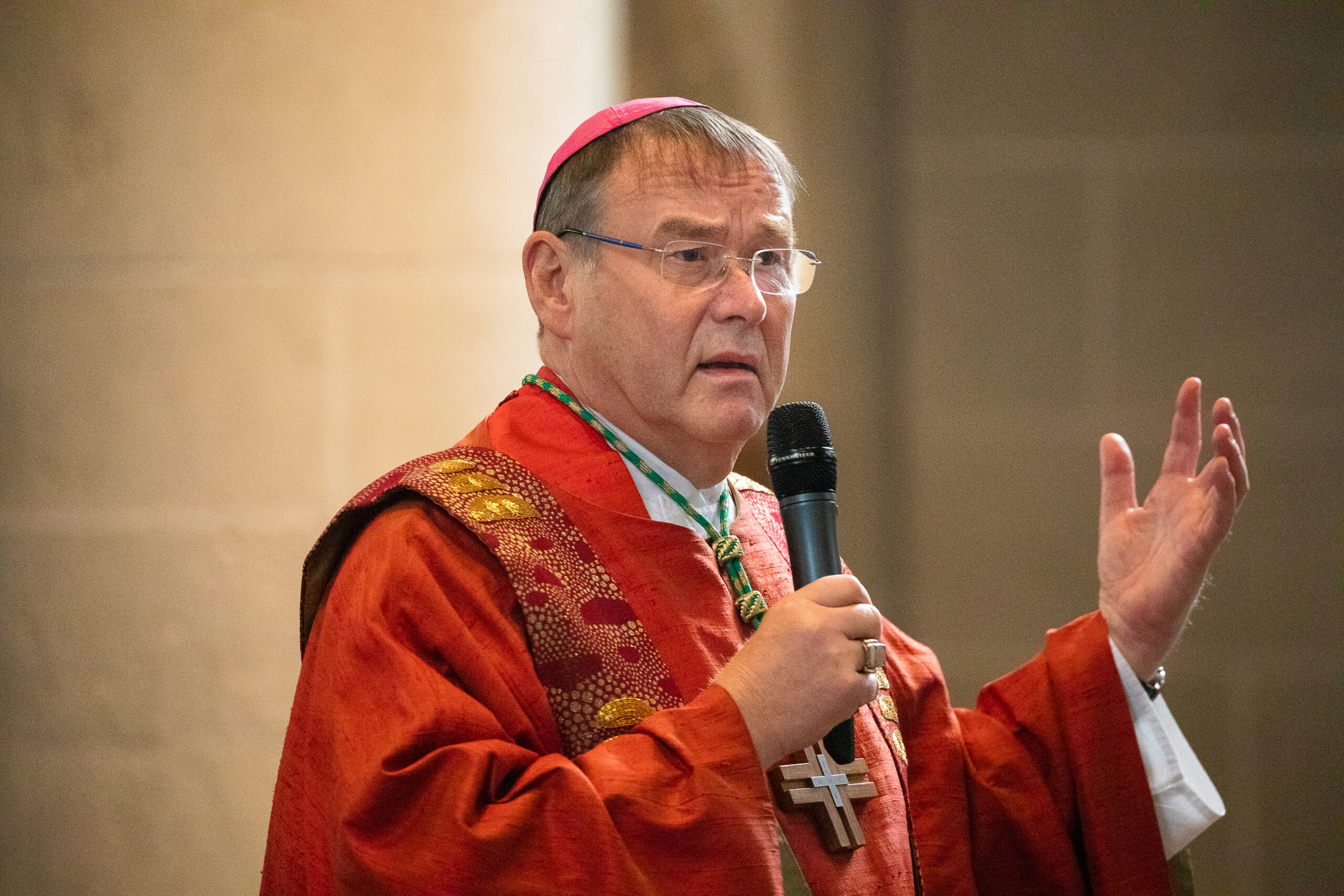A German-language version of this article is available here. This article was translated from the original German by Robert C. Collins, S.J.
Since the General Assembly of the German Bishops’ Conference last autumn, I have been named officially responsible for the pastoral care of queer people in my country, confirming my work since 2018. One explanation for my commitment goes back many years.
In 1967, when my family went on vacation to Bavaria thanks to the support of my father’s employer, my parents took my older brother and me to visit the concentration camp in Dachau. I was 14 years old and I saw the horror and crimes of the Nazi dictatorship in the raw, very unlike the way it looks today. I still can’t forget the images from back then. I can hardly put into words the cruel way people tortured, starved and killed each other.
As an adult, I have visited many more places of such horror and realized that this still happens endlessly today. I deeply regret that I did not ask my parents during their lifetime why we visited the concentration camp. But I thank them to this day for giving me, as ordinary people without any special pedagogical knowledge, something very important for my life. Even if I didn’t realize it at the time, it also influenced my vocation: compassion for every life, respect for the dignity of every human being as a creature of God and opposition to any form of discrimination against people, including the queer community.
Seeing and hearing all people on an equal footing leads to a new togetherness.
Standing against exclusion
“And behold, it was very good!” (Gen. 1:31). Gay men, lesbian women, bisexual, trans and intersex people have always been part of God’s creation. Yet, LGBTQ people are often marginalized in the church. Even family members of queer people feel alone due to the official stance of the church, and they would like more support and acceptance.
LGBTQ people want congregations and groups to continue to take a clear, public stance against exclusion and visibly welcome them. This includes being perceived respectfully and being integrated into active community life, an institution, association or group. Last but not least, pastoral care and church celebrations such as baptism, communion and blessings should be sensitive to LGBTQ people and their families.
Seeing and hearing all people on an equal footing leads to a new togetherness. As Galatians 3:28 says: “There is no longer…male and female, for you are all one in Christ Jesus.”
With rainbow flags on church steeples and institutions, blessing ceremonies and other activities, visible solidarity is shown with LGBTQ, intersex and other queer people. Good signs, but what can we do next? How can Christian communities as a whole become even more open to a multiplicity of lifestyles and identities? The German Bishops’ Conference has found an answer to this question.
How can Christian communities as a whole become even more open to a multiplicity of lifestyles and identities?
Easter is a liberation from constraints
To that end, I would like to share my thoughts with you in the words of my Easter sermon.
The Easter message we have heard is all about witnesses. Easter is the oldest festival in Christian history and it is the highest in the liturgical ranking of feasts. However, Easter is not nearly as popular as Christmas; this has to do with the fact that while everyone knows what a birth is, hardly any of us can imagine a resurrection.
The New Testament is no real help here either. While the birth in the stable in Bethlehem is vividly and movingly described, the Evangelists are silent about the resurrection of the dead, crucified One. This resurrection is not described by them, but only announced or reported as having taken place. It remains invisible. The resurrection is difficult to accept. And that is why lambs, rabbits and dyed eggs dominate the Easter scene.
There are so many new, completely different Easter events that proclaim the resurrection in a secular way, but which show precisely what Easter means. Easter is a rising from a grave, but not necessarily in the literal sense. Easter is a liberation from dullness and oppression, from the supposedly unchangeable; it is the overcoming of fear. Easter means liberation from the constraints of the world and ourselves.
On Easter, we can walk upright again. This is not blasphemy; that’s the way it is even in the Bible. In the New Testament, the same root words “resurrection” and “raising,” which refer to the Easter event, are also used to describe the raising of the sick and blind. “Stand up, he is calling you,” reads the story of the blind Bartimaeus (Mk. 10:46-52).
Easter is a liberation from dullness and oppression, from the supposedly unchangeable; it is the overcoming of fear.
Stand up! The image of the resurrection has an individual dimension here. You have to endure uncertainty and get up in order to shape, act and dare again. And this individual dimension can be transferred to society when people act together.
“Sometimes we get up / we get up for resurrection / in the middle of the day,” writes the poet Marie Luise Kaschnitz. She is referring to overcoming spiritual and everyday death, a state that clings to the status quo, to status, to familiar comforts. Sometimes it takes a long time to achieve such liberation, to reach one’s goal through searching. The Israelites, on their way to the Promised Land, wandered through the desert for 40 years.
It disturbs many Europeans that people from some African and Arab countries are breaking away from there, but aren’t these images of refugees from Lampedusa and the Mediterranean also among the new Easter images? They are images of people who leave everything behind to start a new life. Many people in Europe don’t like that, they see it as an unholy exodus. They reject it as a threat and a danger.
Our duty to speak out
Perhaps it is impertinent to describe the high-risk, often fatal flight across the Mediterranean as an Easter event. But our Easter faith (i.e., the belief that previous thought patterns and legalities were overcome by the resurrection) is also impertinent!
Mary of Magdala stands weeping at the tomb and no longer understands the world, until she is called “Mary.” At the mention of her name, the scales fall from her eyes. There is the one she is looking for: Jesus.
Someone with a name is approachable. He is nameable, tangible. Also tangible for God’s mission. Mary is called as a witness. She is the first to carry the message of the resurrection to the other apostles. “We cannot possibly keep silent about what we have seen and heard” (Acts 4:20).
When we witness injustice, wrongdoing or suffering, it is our duty to speak out and stand up for what is right.
These words remind us that there are moments when silence is not acceptable. When we witness injustice, wrongdoing or suffering, it is our duty to speak out and stand up for what is right.
Our Blessed Nikolaus Gross, who was executed in 1945 at the Plötzensee Prison in Berlin, also warns us today: “If we don’t commit our lives today, how will we stand up before God and man?” We too are summoned and called to be witnesses to the resurrection. Let us become witnesses of the hope that sustains us. The hope that we celebrate here and now, that life is stronger than death. God’s love triumphs.



